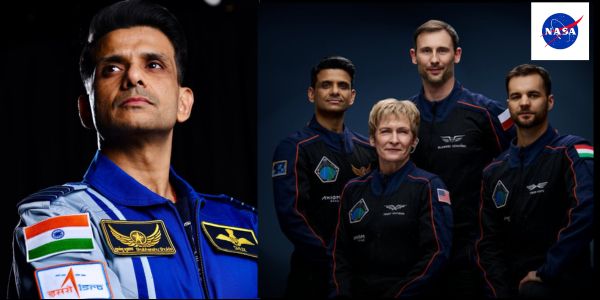Discover Group Captain Shubhanshu Shukla, India’s first astronaut to visit the ISS on the Axiom-4 mission. Explore his education, career, family, and contributions to India’s space program in this exclusive feature by The Interview Times.
In a historic moment for India’s space exploration journey, Group Captain Shubhanshu Shukla is set to become the first Indian astronaut to visit the International Space Station (ISS) as part of the Axiom-4 mission. Scheduled for launch on June 9, 2025, aboard a SpaceX Dragon spacecraft propelled by a Falcon 9 rocket from NASA’s Kennedy Space Center in Florida, Shukla’s journey marks a significant milestone for India, 40 years after Wing Commander Rakesh Sharma became the first Indian in space in 1984.
This article delves into the life, education, career, and contributions of Shubhanshu Shukla, a decorated Indian Air Force (IAF) officer and astronaut-designate, who is poised to inspire a nation of 1.4 billion.
Who is Shubhanshu Shukla?
Born on October 10, 1985, in Lucknow, Uttar Pradesh, Shubhanshu Shukla grew up in a middle-class family as the youngest of three siblings. His early life was shaped by the vibrant culture of Lucknow, a city known for its rich history and academic heritage. The 1999 Kargil War, which unfolded when Shukla was just 14, profoundly influenced his aspirations. Inspired by the bravery of Indian soldiers, he resolved to serve his nation, becoming the first in his family to join the armed forces. Shukla’s journey from a young boy in Lucknow to a trailblazing astronaut is a testament to his determination, discipline, and passion for excellence.

Education: A Foundation for Excellence
Shukla’s academic journey began at City Montessori School in Lucknow, where he excelled in academics and developed a keen interest in technology and aviation. His curiosity and drive led him to pursue higher education at the prestigious National Defence Academy (NDA) in Pune, where he earned a Bachelor of Technology (B.Tech.) degree in 2005. Demonstrating a commitment to lifelong learning, Shukla later pursued a Master of Technology at the Indian Institute of Science (IISc) in Bangalore, one of India’s premier institutions for scientific research. His educational background in technology and computer science laid a strong foundation for his multifaceted career in aviation and space exploration.
Family: A Supportive Backbone
Shubhanshu Shukla is married to Kamna Shubha Shukla, a dentist by profession, who has been a pillar of support throughout his demanding career. While Shukla maintains a private personal life, his sister, Suchi Shukla, has publicly shared pride in his achievements, noting that his astronaut journey began during the challenging times of the COVID-19 pandemic. As the first in his family to join the armed forces, Shukla’s accomplishments have not only made his family proud but also inspired countless young Indians to dream big.
Military Career: A Decorated Test Pilot
Commissioned into the Indian Air Force’s fighter wing on June 17, 2006, Shukla quickly established himself as a skilled fighter pilot and combat leader. With over 2,000 hours of flight experience, he has mastered a diverse range of aircraft, including the Su-30 MKI, MiG-21, MiG-29, Jaguar, Hawk, Dornier, and An-32. His expertise as a test pilot, a role that demands precision and courage, earned him the rank of Wing Commander in June 2019 and Group Captain in March 2024. Shukla’s contributions to the IAF have been marked by professionalism and a commitment to advancing India’s defense capabilities.
Did You Know? Shubhanshu Shukla’s selection for the Axiom-4 mission makes him the second Indian astronaut to venture into space, following Rakesh Sharma’s historic 1984 mission aboard the Soviet Soyuz T-11.
Must Read: Top 10 AI Tools for Researchers in 2025
Astronaut Training: A Global Journey
In 2019, Shukla received a life-changing call from the Indian Space Research Organisation (ISRO), selecting him as one of four astronaut-designates for the Gaganyaan mission, India’s first human spaceflight program. His astronaut training began at the Yuri Gagarin Cosmonaut Training Center in Star City, Moscow, where he underwent rigorous preparation, including advanced simulations and survival training, despite the challenges of the COVID-19 pandemic. Upon returning to India, he continued his training at ISRO’s Astronaut Training Facility in Bengaluru. Shukla also trained at SpaceX headquarters in California and with international space agencies, including NASA’s Johnson Space Center, the European Space Agency’s European Astronaut Centre in Cologne, Germany, and JAXA’s Tsukuba Space Center in Japan. This global training regimen has equipped him with the skills needed to pilot the Axiom-4 mission and contribute to India’s space ambitions.
The Axiom-4 Mission: A Historic Milestone
The Axiom-4 mission, a collaboration between NASA, ISRO, and Axiom Space, will see Shukla serve as the mission pilot alongside commander Peggy Whitson, a former NASA astronaut, and mission specialists Sławosz Uznański-Wiśniewski from Poland and Tibor Kapu from Hungary. Launching on June 9, 2025, the crew will spend up to 14 days aboard the ISS, conducting over 60 scientific experiments, including seven designed by Indian researchers. These experiments focus on microgravity research, such as studying microalgae growth, muscle regeneration, and crop seed resilience, contributing to advancements in crew nutrition, cognitive performance, and sustainable life support systems. Shukla’s participation in Axiom-4 will provide invaluable experience for the Gaganyaan mission, scheduled for 2026, and India’s long-term goal of establishing the Bharat Antariksha Station by 2035.

Contributions Beyond the Cockpit
Shukla’s contributions extend beyond his role as a pilot and astronaut. He is deeply committed to inspiring the next generation of scientists and engineers. During the Axiom-4 mission, he plans to engage in live communication with students via ISS radio systems, fostering curiosity and innovation. Shukla also intends to carry cultural artifacts representing India’s diversity and perform yoga in orbit, showcasing the nation’s rich heritage. His efforts to share his experiences through photos and videos aim to connect 1.4 billion Indians to this historic journey, as he eloquently stated, “This is not just my journey, but the journey of 1.4 billion Indians.”
Salary and Recognition
As a Group Captain in the IAF, Shukla’s salary is aligned with the pay scales of senior IAF officers, typically ranging from ₹1.3 lakh to ₹2.2 lakh per month, depending on allowances and experience. As an ISRO astronaut-designate, he may receive additional stipends for specialized training and mission-related duties, though specific figures are not publicly disclosed. Shukla’s true reward, however, lies in the recognition he has earned as a trailblazer for India’s space program. His selection for Axiom-4 and Gaganyaan underscores his exceptional skill and dedication, making him a national hero and a symbol of India’s growing prowess in space exploration.
A Vision for the Future
Shubhanshu Shukla’s journey to the ISS is more than a personal achievement; it is a defining chapter in India’s space odyssey. His participation in Axiom-4 strengthens ISRO’s collaboration with global space agencies and paves the way for future missions, including crewed lunar landings and interplanetary exploration. As Union Minister Jitendra Singh noted, “Group Captain Shukla’s journey is more than just a flight – it’s a signal that India is stepping boldly into a new era of space exploration.” With his eyes set on the stars, Shukla embodies the aspirations of a nation ready to soar to new heights.
Stay updated with the latest news on India’s space missions and more at theinterviewtimes.com

